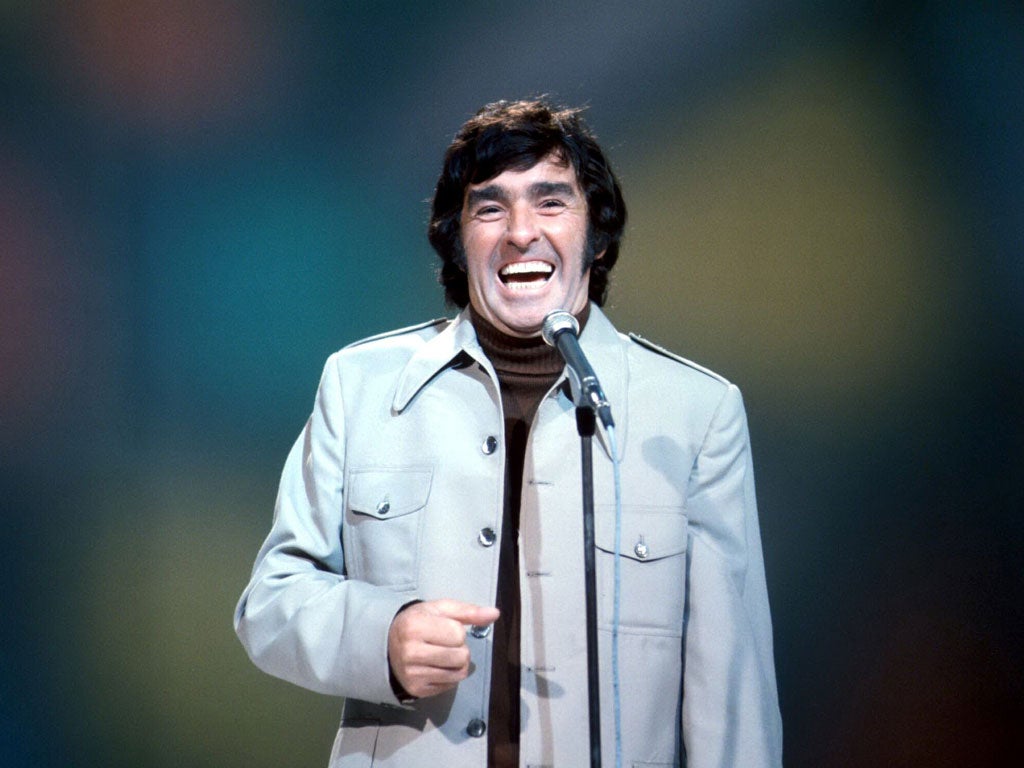Ken Goodwin: Comedian inspired by George Formby
During summer seasons he was supported by his wife, and Bing the dog, named after the singer

Your support helps us to tell the story
From reproductive rights to climate change to Big Tech, The Independent is on the ground when the story is developing. Whether it's investigating the financials of Elon Musk's pro-Trump PAC or producing our latest documentary, 'The A Word', which shines a light on the American women fighting for reproductive rights, we know how important it is to parse out the facts from the messaging.
At such a critical moment in US history, we need reporters on the ground. Your donation allows us to keep sending journalists to speak to both sides of the story.
The Independent is trusted by Americans across the entire political spectrum. And unlike many other quality news outlets, we choose not to lock Americans out of our reporting and analysis with paywalls. We believe quality journalism should be available to everyone, paid for by those who can afford it.
Your support makes all the difference.In the early 1970s, the comedian Ken Goodwin, who has died aged 78, was hailed as the first star to have been created by the showcase series The Comedians (Granada, 1971-80). Tall and loose-limbed, often shrugging his shoulders, with black hair of considerable width and thick black eyebrows that were almost rectangular, he tended to laugh at his own jokes, but in a manner that implied he knew how old they were. Unlike some of his contemporaries, insulting minorities was not his stock in trade, nor did it suit his demeanour. He was recognisably in the same mode as George Formby, whom he had a sideline imitating, complete with ukelele. His catchphrases "Settle down, now" and "Do you get it?" made him a target for impressionists during that brief period.
Born in Manchester, he had begun playing the banjo and doing impressions of Formby to amuse his schoolmates, transferring this to local social clubs in his teens. He had graduated to working men's clubs, mainly in South Yorkshire, by the early 1960s, maintaining a day job as a door-to-door salesman. At Salford in 1964, he shared the bill with Gerry Dorsey, who subsequently renamed himself Engelbert Humperdinck.
Goodwin's television debut was later that same year on Opportunity Knocks, then produced by the former magician Peter Dulay. Despite winning hissegment, Goodwin was kept out of the series final by an accident thatconstricted movements in both his hands, resulting in his directing his act more towards comedy and recuperating by studying commercially available joke books.
His agent was the Liverpool-based Mike Hughes, whose other clientsincluded the future children's presenter Johnny Ball, and Freddie Starr, then one of a band, The Delmonts. Afterseveral radio shows in 1966 for the BBC Light Programme, Goodwin was in one of the first colour editions of The Good Old Days in 1970, headlined by Danny La Rue. That show's producer, Barney Colehan, also oversaw Ace Of Clubs (BBC, 1970), hosted by Michael Aspel andcovering The Stage newspaper's Club Acts of the Year Awards. In its Comedy category, Goodwin got as far as thefinal before losing out to the malfunctioning-microphone specialist Norman Collier.
The Comedians was in fact that series' working title, producer John Hamp seeing no need to alter it, unlike the original performance footage, which he claimed had been seven and a half hours' footage of 30 stand-ups edited down to make the first series: "We have found that a gag from one comic will link in well with one from another." The author Louis Barfe described the result as "a quick-fire comedic assault".
A documentary on the series, There Was This Fella (Granada, 1971), was produced by the future government minister and peer, Gus Macdonald. An album, Laugh With The Comedians, sold well in 1971: Goodwin was included in a stage tour by the principals the following year, and had the closing spot in their London Palladium season in April 1972.
He did The Royal Variety Performance in 1971, on a bill heavily geared to traditional variety. It's Ken Goodwin (Granada, 1971) was a one-off special produced by Hamp and broadcast over Christmas. After leaving The Comedians in 1973, Goodwin eschewed his colleagues' penchant for game shows and concentrated on cabaret, pantomimes and cruise ships. On summer seasons, he was sometimes accompanied by his wife, the singer Vicki Lane, and Crosby, an Alsatian named after Bing who was trained to leave the stage when Goodwin began singing. In 1983 he said, "I would love to return to TV as a villain in a drama series." The nearest he got was Treacle (1988), a short film set in the director Peter Chelsom's native Blackpool.
In a 1982 article in The Stage, he posited that "the British summer show exported to the Continent could be a viable proposition." Four years later, however, one such show at a theatre in Spain, where he had a holiday villa, closed after two weeks.
The 1985 pantomime at Richmond, Babes In The Wood, curiously starred Spike Milligan and Peter Wyngarde, with Goodwin as Freddie the Jester. Cinderella at Gravesend in 1992 was marred by a dispute over billing in which Goodwin was supported by six other cast members, but he collapsed and was rushed to hospital two days before the last performance.
His final TV appearance was areunion special, The Comedians Christmas Cracker (Granada, 1993). Onstage he did The Original Comedians On Tour, in 2004. Both featured Frank Carson, whom Goodwin predeceased by four days.
Ken Goodwin, comedian: born Manchester 7 April 1933; married Vicki Lane; died Rhos-on-Sea 18 February 2012.
Join our commenting forum
Join thought-provoking conversations, follow other Independent readers and see their replies
Comments